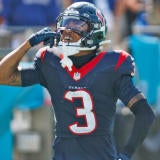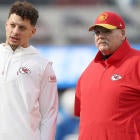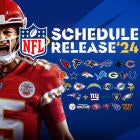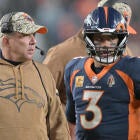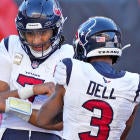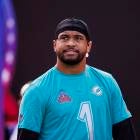 |
| Peyton Manning has played solid for the Broncos, but they need him to be special to be successful. (Getty Images) |
The phrase "work in progress" is heard often in regard to the Denver Broncos, and is a catch-all justification for the timing problems, drops and breakdowns for an offense adjusting to QB Peyton Manning -- and Manning adjusting to his post-surgical limitations.
But it became clear Sunday that the defense is adjusting, too. It has seven starters who were not in the starting lineup at the end of 2011, and Sunday night against the Houston Texans, the unit was plagued by missed assignments that directly led to two first-half touchdowns.
Offense: C-minus.
Manning didn't look as shaky as he did in Atlanta six days earlier; he did complete a pair of 30-yard passes -- and would have had another if Demaryius Thomas had managed to drag his back foot on a potential touchdown in the fourth quarter. But three of his passes could have been intercepted, and six were dropped; the only wide receiver who caught every pass targeted to him was 36-year-old Brandon Stokley. Manning's completion percentage (50 percent) was his lowest since December 2009. The run game struggled when Willis McGahee succumbed to a rib cartilage injury, although it -- and Manning -- were under fire from the with the Texans exploiting fill-in RG Manny Ramirez. The Broncos never imagined they would need regular RG Chris Kuper so badly; but he hasn't even practiced since fracturing his forearm Aug. 14.
Defense: C.
It seemed mystifying that 328-pound DT Kevin Vickerson was asked to cover 229-pound Arian Foster in the flat on a third-and-goal play, and the result was predictable: a touchdown. But Vickerson should have had help on the play. This was also a theme of the first touchdown allowed, when there was no safety assistance for Tracy Porter, who was in one-on-one coverage against Andre Johnson. Rahim Moore might have been able to help, but bit on the play-action and was burnt by it. Denver allowed Houston RB Arian Foster to run for 105 yards and its linebackers were often pushed back by the Texans' front. One positive for the defense; it cleaned up its tackling issues, with only two clear missed stops.
Special teams: C-minus.
KR Omar Bolden's decision-making has improved on kickoff returns, but his 22-yard average Sunday was mediocre. Britton Colquitt and Matt Prater were up to their usual standard on punts and placekicks, respectively. But when the Broncos needed every possible second to attempt a last-ditch comeback, Eric Decker made a horrendous decision, electing to field Donnie Jones' punt at the Denver 1-yard-line with 27 seconds to go instead of letting it bounce into the end zone, costing the Broncos seven seconds. Decker's flair for spectacular returns is why he was in for regular returner Jim Leonhard, who is averaging a pedestrian 5.7 yards per punt return this year, including 5.3 on Sunday.
Coaching: B-minus.
In-game adjustments saved the Broncos from serious damage early and allowed them to come back -- particularly placing Champ Bailey exclusively on Andre Johnson after Porter left with a knee bruise. The Broncos also went heavy into the no-huddle in the second and fourth quarters, and scored 20 of their points on four no-huddle series. But why didn't the Broncos abandon the huddle earlier?
For up-to-the-minute Broncos updates, follow Andrew Mason on Twitter at @CBSBroncos and @MaseDenver.







